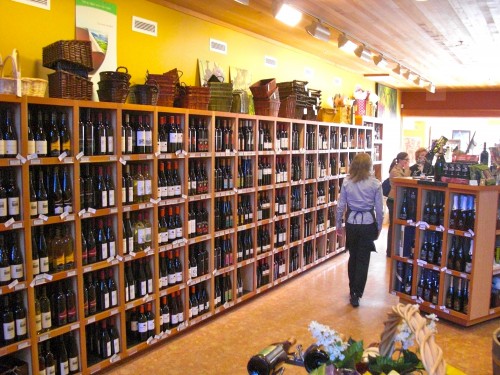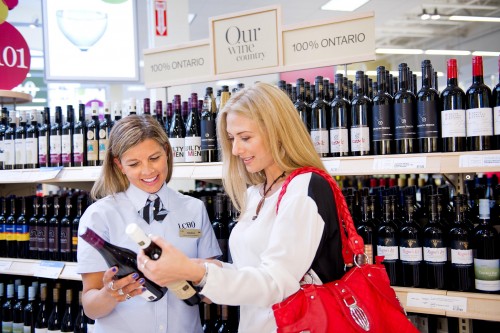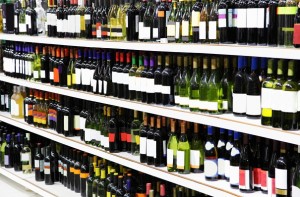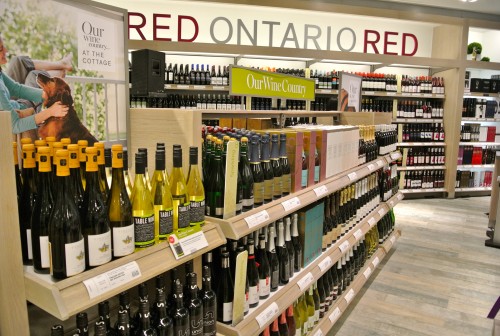
When the Liberal government stands up to deliver its budget at Queen’s Park in the next couple of weeks a brave new world will be unveiled for Ontario residents who have lived under the stubborn smouldering ashes of post-Prohibition for nine decades.
We have all read in dribs and drabs some of the initiatives that are being considered to bring the province’s antiquated liquor retail laws into the modern era. Ed Clark, ex-banker-turned-liquor-czar appointed by Premier Kathleen Wynne to come up with a plan, has been very busy gathering up ideas from all vested partners in the booze sector in this province. His blueprint for modernization is beginning to take shape but no one, absolutely no one, knows for sure what shape it will absolutely take other than it is the beginning of the process to strip ultimate power from three monopolies — The Beer Store, the LCBO and the two companies that hold hundreds of “private” licences to sell wine in their own stores (Peller and Constellation Brands) — and hand it over to private enterprise.
Clark has a lot of balls in the air; his office has been as busy as a subway turnstile at rush hour. But a couple of key initiatives seem to be emerging as the main planks in his plan. And since Wynne has given him all the power to devise the plan as he sees fit, it’s likely most of his final ideas will emerge as reality for consumers in Ontario.
These are heady times. Behind closed doors a lot of discussion is happening, a lot of debate and planning is going on in advance of the day Wynne’s Liberal government utters those words many of us have longed to hear for so long: An end to the LCBO and Beer Store monopolies on wine and beer in Ontario.
Here’s how I see the future for buying wine and beer in Ontario after talking with industry insiders.
Grocery store craft beer and wine

There is no doubt Ed Clark, below, likes the idea of beer and wine being sold along side your Cheerios, kale and popcorn. He’s met with grocery chain executives and hammered out some ideas for selling wine and beer in grocery stores. He does not want the rigid rule of the LCBO involved in this one bit, aside from distribution.
 The plan would be for independently run (by independent I mean free from the shackles of the LCBO) in-store craft beer and VQA wine chosen and sourced by the store (but don’t rule out international wines and beer being part of the deal just yet), much as it does for produce that fills the shelves now. A total of 300 supermarkets would be involved with no one chain allowed more than a quarter of the licences (source: The Star).
The plan would be for independently run (by independent I mean free from the shackles of the LCBO) in-store craft beer and VQA wine chosen and sourced by the store (but don’t rule out international wines and beer being part of the deal just yet), much as it does for produce that fills the shelves now. A total of 300 supermarkets would be involved with no one chain allowed more than a quarter of the licences (source: The Star).
Grocers do not know at this point if they would be allowed to sell ALL beer (beyond Ontario craft) and ALL wine (beyond Ontario VQA) and executives aren’t particularly concerned with that element.
If it was only Ontario products, they feel that fits perfectly in with a philosophy of selling local products wherever they can.
Grocers feel beer and wine are a perfect fit for the various stores scattered around the province and an even better fit for flagship and marquee stores in big urban centres.
Not every store that has a licence would be the same. Each store would have its own personality tailored to the demographic of the neighbourhood where it is located. A grocery store in Rosedale would obviously have higher-end products than a store in Sudbury.
Even if grocery stores were given licences to include international brands, at least one chain says it would still focus on Ontario craft beer and VQA wine because that is what their customers want — local, local, local.
This would be viewed as a win for consumers, Ontario craft beer producers, and VQA wine producers.
Sales of these products would be “over promoted” and prices negotiated and set by the grocery store, not the LCBO (which would take a back seat to grocery store sales). This part could prove tricky and we’ll have to see where Clark goes with this. In B.C. private wine stores cannot undercut B.C. government store prices but can source different wines and set prices that way. The B.C. government stores can take that listing if they see success in the private stores and then set prices. It’s complicated.
 The beauty of independently purchasing your own wine and beer is there is so much not being purchased locally by the LCBO that finding unique products to fill grocery store shelves would be simple and unique, in other words, competition for the LCBO.
The beauty of independently purchasing your own wine and beer is there is so much not being purchased locally by the LCBO that finding unique products to fill grocery store shelves would be simple and unique, in other words, competition for the LCBO.
One executive who I talked to said grocers are not interested in appealing entirely to the lowest denominator; they want a nice mix of affordable products and high-end products depending on where the store is located. Because it is independent, it does not have to act like the LCBO monopoly and make each product it sells available in every store.
Grocery store liquor stores are already firmly established in the private system in Alberta. Stores have to be separate from the main grocery (such as in the parking lot, but not attached to the store, which is different to what’s being proposed in Ontario) but have total freedom to sell what they want. Having lived in Alberta the stores are a mixed bag of affordable wines to high-end Napa cabs and everything in between at very competitive prices. If you are a wine lover in Alberta you are doing yourself a disservice by ignoring those grocery liquor stores based on price alone. And, you have to remember, they are competing against a range of private stores. In Ontario, the competition will only be from the LCBO and the limited number of private licences (up to 50) Clark decides to claw back from Peller and Constellation Brands.
Clark also sees beer in grocery stores as a key plank in his plan to end the stranglehold The Beer Store has on beer sales in Ontario with its 448 outlet stores. Grocery stores provide an outlet for consumers to purchase the myriad and explosive craft beers being made in Ontario as well your standard, every day beers. In other words, an end to The Beer Store’s brutal monopoly that’s owned by foreign big-beer conglomerates. Clark also wants a bigger cut of The Beer Store profits to the tune of as much as $100 million for annual franchise fees and shelves opened up fairly to craft brewers (source: The Star).
VQA private stores
 For the Ontario wine industry, a Toronto Star story last Friday touting grocery store beer and wine was a bit of shock. Sources had earlier told me that 25-50 licences would be given to the private sector as a starting point for partial privatization and an answer to increased access to consumers.
For the Ontario wine industry, a Toronto Star story last Friday touting grocery store beer and wine was a bit of shock. Sources had earlier told me that 25-50 licences would be given to the private sector as a starting point for partial privatization and an answer to increased access to consumers.
With the talk now squarely on grocery store beer and wine, the wine industry in Ontario is left to wonder if the 50 or licences that they thought were a sure-thing might now come down the road and won’t be a major focus of the budget speech.
But insiders still believe Ed Clark will to claw back licences from the nearly 300 that are owned primarily by Peller and Constellation Brands. These licences are protected under a pre-NAFTA agreement, which means they can sell VQA only wines. They are now used by those two companies to sell only their products in those stores, some of if VQA, some internationally blended wines. Many feel that this is unfair for the hundreds of other wineries in Ontario, which have to rely on the LCBO or winery sales at their own retail shops in Niagara, Prince Edward County or Lake Erie North Shore.

The common belief is that anywhere from 25-50 licences will be stripped away and given to VQA wineries to sort out and distribute. I do not know how that will work or how they will be distributed, and neither does the Ontario wine industry at this point, but the prospect is exciting.
The Ontario Wine Council has advocated for private retail stores that would include both VQA wines and international wines. A VQA-only model would be a giant step in the right direction for VQA wineries which can’t nearly get enough exposure or sales at the limited shelf space at the LCBO. They feel they have a great product but limited access has stunted growth even as more and more wineries continue to be built.
The Ontario wine industry has been burning the midnight oil trying to get a handle on the potential changes coming to Ontario. And now, with the news Friday, it needs to get a feel for what grocers will potentially do. Questions have emerged, such as:
• Will there be sommeliers, and trained wine staff at grocery outlets to help consumers make good decisions?
• Where in the stores will the beer and wine be located?
• Will the VQA products in the stores come from existing listings already at the LCBO?
As one source told me, this is only Chapter 1 of 6 with a lot more questions than answers at the moment.
Potential Winners
 • The biggest winner of all is Kathleen Wynne, the first premier in 90 years to start the process of modernizing booze laws in Ontario and wresting total control from the hands of the LCBO. Take a bow. She will have to deal with some enemies (union, C-stores, LCBO, The Beer Store, etc.). But she is doing this early in her term as premier.
• The biggest winner of all is Kathleen Wynne, the first premier in 90 years to start the process of modernizing booze laws in Ontario and wresting total control from the hands of the LCBO. Take a bow. She will have to deal with some enemies (union, C-stores, LCBO, The Beer Store, etc.). But she is doing this early in her term as premier.
• Consumers. Yeah, us. More selection, more convenience, more pride in our local products. We will not be the laughing stock of all the other forward-thinking jurisdictions in the world who have been enjoying the simple pleasure of shopping for beer and wine beyond one government entity.
• VQA wineries, Ontario craft brewers and potentially Ontario craft cider makers. A whole new world awaits you for increased sales, increased appreciation, incentive to do more, incentive to be more creative and incentive to be better.
• Ed Clark. You drink for free in Ontario if this happens. It’s on us.
• Government coffers. Think about it. More taxes will come rolling in, less infrastructure money being spent to build more LCBO stores because the private sector is taking care of that for you, and hopefully, one day, a less burdensome bureaucracy of LCBO executives sucking up big salaries paid for the people of Ontario.
• More jobs to stimulate the economy. I have no idea of the numbers but it will be significant. Maybe they won’t be paid the same as LCBO workers get now, but there will be good jobs for a lot of people looking to get into the industry on the ground floor. And I suspect the residual of that is more work in wine country, beer country and cider country.
• Wine agents. Here’s the deal. You’re an agent, you get a meeting with the one person at the LCBO who holds all the power and tell them you have a great wine you’d like to see listed. That person doesn’t like the cut of your jib, your tie or your knock-knock joke. You’re told to take a hike and never come back. You are forever doomed with no recourse. Now they you will have a number of options and greater opportunity for someone to like your tie, your joke and, heaven forbid, the wine they are trying to flog. More opportunity.
Potential Losers

• The LCBO. When (and if) this plan moves forward and proves successful the LCBO will slowly start to shrink. I envision that with success, as is what happened in B.C., a moratorium will be placed on any new LCBO stores being built and more private licences being issued.
• The Beer Store. Ouch, Clark really has it out for these guys who have had a sweet ride in Ontario for a very long time. Can they absorb the steep “franchise fee” being imposed on them? Can they survive the competition coming their way? Only time will tell, but The Beer Store is likely just beginning to write its last chapter in Ontario, at least in its present form.
• Peller and Constellation Brands. Licences are going to be clawed back, there seems to be no doubt about that, it will hurt the bottom lines of both of these companies. On the bright side, they have both enjoyed a nice, long run of exclusivity in Ontario only through a quirky pre-NAFTA agreement that probably should have expired long ago. It simply isn’t fair to the rest of the wine industry in Ontario. I like both of these companies, they own some very fine brands in Ontario and B.C. but it’s time to compete on even playing field.
• OPSEU, the union representing 5,000 LCBO workers in Ontario, is blowing a gasket at the prospect of grocery store wine and beer sales and private licences. Warren Smokey Thomas even put out a press release warning that violence against women will increase if this goes through, though he didn’t explain himself and didn’t point to statistics in any other jurisdiction in the free world were this has happened. You’ll have to do better than that, Smokey.







Potential Losers… the Ontario Craft Cider industry. Cider, produced and grown in Ontario is “deemed” to be a foreign produced product by the LCBO. Therefore it may not be eligible to sold through these new venues. Cider is the fastest growing segment of the global liquor industry yet Ontario Governments (current and past) continually overlook the potential of this derivative agricultural product as a rural economic driver .
Grant … I did ask about cider and where it fits into this potentially new world that awaits and was told by one source that cider (Ontario craft cider) is something grocers would want on their shelves. But, as you point out, what will cider be classified under? P.S. The LCBO classifying Ontario craft cider as “foreign produced” is total BS. You know it, I know it, the people of Ontario know it. But this is what happens when all the power is given to one stubborn entity, in this case the LCBO.
Another loser in the same pile as 100% Ontario ciders… QC (quality certified) fruit wines from 100% Ontario fruit that go through similar testing to VQA wines and yet, will be left out of this discussion to improve their markets and provide diversity to consumers.